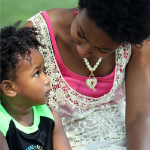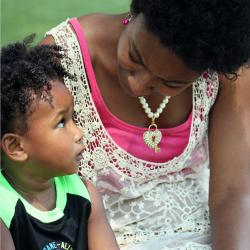Parenting | 10 Ways to Deal with Those Awkward Questions
 Children are so inquisitive. They love information. They ask constant questions as their minds are continuously processing everything they see and hear in the world around them. Children come to their parents all the time to clarify the things they don’t really understand. As parents, we want to help our children learn and understand yet sometimes when they ask an ‘awkward question’ it is tempting to gloss over it (and maybe run for the hills and hope when we get back they will have forgotten!).
Children are so inquisitive. They love information. They ask constant questions as their minds are continuously processing everything they see and hear in the world around them. Children come to their parents all the time to clarify the things they don’t really understand. As parents, we want to help our children learn and understand yet sometimes when they ask an ‘awkward question’ it is tempting to gloss over it (and maybe run for the hills and hope when we get back they will have forgotten!).
There are so many issues that parents can find difficult to discuss with their children. Depending on our own experiences and beliefs, how ‘awkward’ a question is for us as individuals can vary hugely. For many parents, those awkward questions may include: “Where do babies come from? What is sex? What is gay? Why does he have two mammies? Why don’t I have a mammy? Why don’t I have a daddy? What is homeless?” By not answering awkward questions and telling children they are ‘too young’ to know such things, we are making taboos of so many subjects that are normal in our society. Children will learn quickly not to ask us anymore, and then they will in time find other sources – perhaps unreliable sources – to answer their questions. A question will not go away until your child is satisfied with the answer they find.
This week in our ’10 Ways to’ parenting tips series, we explore some strategies that as parents we can put in place to support us in answering those awkward questions that our children send our way.
- Don’t try to fob a child off by changing the subject or saying they are too young. If they are old enough to ask, they are old enough to get some information.
- Be honest in an age appropriate way. This does not mean you wait until they are teens to tell them things (when you may be even more embarrassed). Give children little bits of information to match what they can understand as they develop. Plant the seeds and build the tree over time with them.
- At times a question may upset you yet this is no reason to not answer it. You may have to explain to your child that this question makes you a little sad but that you will talk with them about it. A parent absent from your child’s life is often very difficult to talk about and many parents worry that their child will feel the rejection they themselves may have experienced, but remember that children have a different relationship with and perception of an absent person in their life. They will not feel the same as you. Here we explore ways to explain an absent parent.
- Be factual and try not to make the information about any subject into a fairy tale. Educate your child about families and all the diverse families in our society.
- If you make any issue into a taboo when children are young, they will be less inclined to talk openly with you when they are older. Try to have an open relationship with your child from the first days. Once they start talking to you, start talking and sharing with them. Remember that even though it may seem a long time away now, you don’t know what choices your child will make as they grow up and you don’t want them to think that you may be unsupportive of them in the future.
- Just because you explain once, that probably won’t mean that you’re off the hook. Children take pieces from each and every conversation. Some bits they recall and other bits get left behind. They will ask you again so try to be patient and answer them again. Maybe you can add in additional age appropriate detail the next time.
- There are many excellent books out there to support parents in talking with children about almost every topic. Perhaps you can get some books in the library and introduce them during story time. Plant the seeds of knowledge and allow your child to process the information and to know they can come back to you when they need to ask more questions.
- If your child has wrong information or understanding, such as about who their dad is or if they have the same parents as their sibling, then correct them from the first error. With many families we work with, children are growing up with step-parents having previously had a relationship as a baby with their other biological parent who separated from the family and they may have forgotten this. Try to keep the information clear, show them photos if you have them, be open and honest or you will only create more awkward situations in the future which can lead to your child losing trust in you. Always try to build your relationship based on trust.
- At times your child’s other parent might object to you answering these awkward questions. Try to talk with them and help them to understand why it is important to answer your child’s questions honestly. Once you are sharing age appropriate information, then you need not worry.
- Seek support from service providers such as One Family if you would you like support in talking with your child about challenging situations. Once you start to talk openly with your child and believe that you are the right person to help them understand the very complex world we live in, then it will become easier for you.
This article is part of our weekly ’10 Ways to’ series of parenting tips, and is by One Family’s Director of Children and Parenting Services, Geraldine Kelly.
Next you might like to read: 10 Ways to Support Your Child’s Sex Education, 10 Ways to Explain An Absent Parent or 10 Ways to Talk To Your Child About ‘Where Do I Come From’.
Find out more about our parenting skills programmes and parent supports. For support and information on these or any related topics, call askonefamily on lo-call 1890 66 22 12 or email support@onefamily.ie.



 At times we make big changes in our lives and we plan around how we can manage these changes for us as adults. However, it is important also to explore what changes are taking place for your child and to support them through this.
At times we make big changes in our lives and we plan around how we can manage these changes for us as adults. However, it is important also to explore what changes are taking place for your child and to support them through this.
 Travelling anywhere by any means with young children can be a challenge. These tips are intended to support you when travelling mostly on a bus or by train with young children.
Travelling anywhere by any means with young children can be a challenge. These tips are intended to support you when travelling mostly on a bus or by train with young children.
 2015 is shaping up to be a big year for children’s rights, especially with regard to Family Law. Children are now being placed at the centre of legislation that directly affects them and their parents. Talking about your family situation can be difficult especially if you, as a parent, are struggling to cope yourself. Here are a few tips to help you to open a dialogue with your children and ease them into a secure understanding of their family.
2015 is shaping up to be a big year for children’s rights, especially with regard to Family Law. Children are now being placed at the centre of legislation that directly affects them and their parents. Talking about your family situation can be difficult especially if you, as a parent, are struggling to cope yourself. Here are a few tips to help you to open a dialogue with your children and ease them into a secure understanding of their family.
 Play is an outlet for children to make sense of what they see, think and feel. It allows them the opportunity to express themselves, which is a vital part of their physical, intellectual and emotional development. Children can often struggle with their feelings and this frustration can lead to difficult behaviour, such as tantrums. It is important that parents take an active role in their child’s emotional development and to lead by example when it comes to expressing anger, sadness and frustration in a healthy way.
Play is an outlet for children to make sense of what they see, think and feel. It allows them the opportunity to express themselves, which is a vital part of their physical, intellectual and emotional development. Children can often struggle with their feelings and this frustration can lead to difficult behaviour, such as tantrums. It is important that parents take an active role in their child’s emotional development and to lead by example when it comes to expressing anger, sadness and frustration in a healthy way.
 Consistency is vital to teaching your children that all behaviour breeds a reaction and whether that reaction is good or bad depends on how they choose to act. Enabling them to make good choices by being consistent in your reaction is a powerful tool in handling difficult behaviour.
Consistency is vital to teaching your children that all behaviour breeds a reaction and whether that reaction is good or bad depends on how they choose to act. Enabling them to make good choices by being consistent in your reaction is a powerful tool in handling difficult behaviour.
 Difficult behaviour can be tough to deal with, especially when you are already under stress. Children act out for many reasons and tantrums are often the result of frustration and misunderstanding. Here are a few tips on how to handle this difficult behaviour and to teach your children the power of positive choices.
Difficult behaviour can be tough to deal with, especially when you are already under stress. Children act out for many reasons and tantrums are often the result of frustration and misunderstanding. Here are a few tips on how to handle this difficult behaviour and to teach your children the power of positive choices.
 Active Listening is an important part of being an assertive parent. It allows children to express their emotions and shows your child that you are taking on board what they are saying and making an effort to understand how they are feeling about what is going on in their lives.
Active Listening is an important part of being an assertive parent. It allows children to express their emotions and shows your child that you are taking on board what they are saying and making an effort to understand how they are feeling about what is going on in their lives.
 It is important for you and your children to have a sense of pride about your family. No matter what form your family takes, what wealth you may or may not have, or what activities you may or may not do, being secure in one’s family and self – which will nurture family pride – is achieved through building strong supportive relationships. It is the quality of these relationships at home that has most importance for a child’s outcomes. When every member of the family feels cherished and valued, they experience higher self-esteem which contributes to family self-esteem. To build strong relationships, establish pride and a sense of innate family self-esteem, we must encourage positive emotional growth in our children and in ourselves. In this week’s instalment of our ’10 Ways to’ parenting tips series, we looks at some ways to nurture positive growth and your family’s sense of pride.
It is important for you and your children to have a sense of pride about your family. No matter what form your family takes, what wealth you may or may not have, or what activities you may or may not do, being secure in one’s family and self – which will nurture family pride – is achieved through building strong supportive relationships. It is the quality of these relationships at home that has most importance for a child’s outcomes. When every member of the family feels cherished and valued, they experience higher self-esteem which contributes to family self-esteem. To build strong relationships, establish pride and a sense of innate family self-esteem, we must encourage positive emotional growth in our children and in ourselves. In this week’s instalment of our ’10 Ways to’ parenting tips series, we looks at some ways to nurture positive growth and your family’s sense of pride.
 Being out and about shopping with young children can be stressful. This week in our ’10 Ways to’ parenting tips series, we explore some tips that will help you keep them safe.
Being out and about shopping with young children can be stressful. This week in our ’10 Ways to’ parenting tips series, we explore some tips that will help you keep them safe.